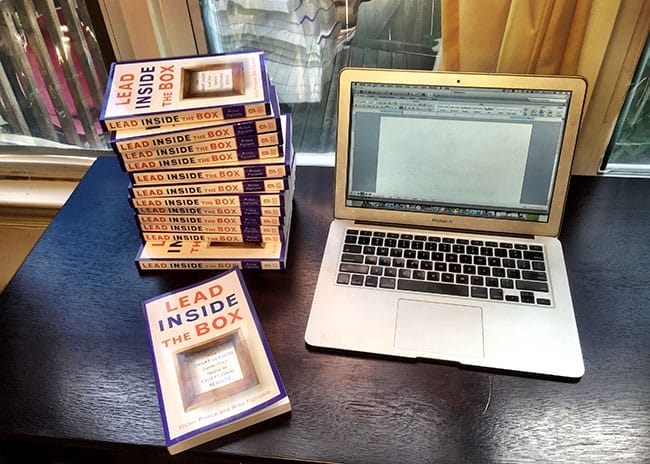I’ve had the “I want to write a book some day” item on my bucket list for a long time. Then life happened, and I found myself in my 40s without a book to my name. Last week, my first book officially released, and, based on pre-sales that have put it on Amazon’s Top 10 Hot New Releases, it looks like my mother won’t be the only other person reading it.
I am writing this blog to help other aspiring authors get past the hump between “life happens” and a life goal. Here are the eight lessons that got me over the hump to put my first book out at age 40-something.
Tip #1 – Decide You Can:
Writing a business book sounds impossible; that’s why many people never try. It’s been the hardest thing I have ever done, but obviously it isn’t impossible since other people have been doing it for hundreds of years.

The author on the ancient Camino de Santiago pilgrimage trail
A key for me to get over the hump was to do something else that sounded impossible but I knew that other, seemingly ordinary, people do all the time. I stumbled on the Martin Sheen movie The Way about people walking across Spain on the ancient Camino de Santiago pilgrimage trail. Something clicked. A few months later, I flew to Spain with just a backpack and broken-in hiking boots. Thirty days, 500 miles and countless blisters later, I found myself in the cathedral in Santiago de Compestela celebrating with other successful pilgrims. (See my blogs about hiking the Camino.)
From that day forward, I have faced any new challenge by telling myself, “I walked across Spain, I can do that.” Writing a business book didn’t look as crazy anymore.
Even if a hike across a country isn’t for you, find something that seems slightly impossible in another area you do like and challenge yourself.
Tip #2 – Writers Write:
You may have the greatest book idea in your head, but nothing exists until you put it on paper … or at least in pixels. When I was on the Camino, I started writing daily blogs about my adventure. When I look back on those blogs now, I smile and cringe at the same time. I cringe because my writing today is much better than it was two years ago. Like most things, writing gets better with practice. I kept writing after I got back from the Camino. I blogged and attracted few readers, but I kept blogging. Somewhere along the way, I found my writing voice. I learned to write to convey ideas to others instead of writing to demonstrate how clever I am to others. I’ve long had experiences and ideas I thought worth sharing, and by writing regularly, I developed the muscles to translate those thoughts into words on paper.

Tip #3 – Recruit a Posse:
It takes a village to write a first book in your 40s, and I was lucky to have two co-pilots and a big ground crew.
First, like many aspiring authors, once I had an idea on paper, I looked for anyone else I knew who had successfully written a book to ask for their advice. Is there a book here? If so, how do I take it from an idea in my head to a business book in stores? I called an old colleague, Mike Figliuolo, who had written a successful book a few years earlier. Mike not only liked the book idea, he said, he would love to co-author it. Partnering with him was an easy, and great, decision.
My second co-pilot was someone I met while hiking the Camino—the “inspiration” I thanked in the Acknowledgments in the book. The 18 months from book idea to book release had many ups and downs. Every time I hit a low point, she pulled me up and she continues to be my biggest supporter.
Finally, my “ground crew” consisted of all my friends and family who I had told about my book idea as a forcing mechanism to make me stay the course. I acknowledged my “ground crew” in the opening of the book with these words: “To all my family and friends who asked me at some point about how ‘The Book’ was coming along—writing a first book is a lonely, uncharted trek with no guaranteed finish line. Even the smallest gestures of interest and support meant more than you realized.”

Tip #4 – Armor Up:
Publishing a book is a deeply personal experience. When you put your thoughts on paper, you are putting a piece of yourself out there for other people to criticize or, even worse, to ignore. The best advice I got was to realize that criticism, or indifference, is not about you; they are about how well you translated that piece of yourself onto paper. And that is a skill you can improve. (See Tip #2: Writers Write).
Tip #5 – Get a Deadline:
Notice I wrote, “Get a deadline” not, “Set a deadline.” The single biggest thing that moved me from aspiring author to new author was a contractually imposed deadline. Once I signed a deal with a publisher, I had to turn in a manuscript, on spec, on deadline or face consequences. The fear instinct is a powerful motivator. Use it to your advantage.

Tip #6 – Find Your Writing Place:
My home office works for my regular business, but it didn’t work for writing a book. Writing is the most intensive mental work I have ever done. I found I needed to be away from my distractions at home to focus. I also found that new locations spurred my creativity. So I ended up rotating between a few coffee houses and restaurants in my neighborhood, with a friend’s dining room table tossed in as well to keep up the momentum.

Tip #7 – 50% Authorship, 50% Other-ship:
Writing is only part of what it takes to publish a first book. To get anyone to read your book, you have to help market it. Days after I signed my book deal, the publisher sent us different options for the cover design to choose from. Once the book has a cover, Amazon and other online sellers post it for pre-orders, so you need to set up your presence as an author (and affiliate seller.)
Once you finish your manuscript, you need to start calling in favors to get big name people to write endorsements for your book cover. After you get your endorsers, you need to start working on getting blogs and other media to help get the word out about your book. And then on the day the book officially releases …
#8 – Enlist the Village:
I don’t like asking for favors, and I hate the idea of selling stuff to my friends. But, after some good advice, I decided to ask family and friends for help with getting the word out about my first book. It was less about getting them to buy a copy of the book (although pre-orders and first week sales are the key to cracking the bestseller lists). It was more about sharing my excitement about a big life event. For a first-time author, announcing a book is somewhat like a new parent announcing a new baby. One difference: I put my first words on paper for this book about 18 months ago, so maybe I should have twin books to show for my effort today.

If you have a goal to write a business book, I hope these tips help you. If you know someone else who wants to write a book but hasn’t gotten over the hump yet, feel free to share this with them. Best of luck.
Editor’s note: The original version of this post appeared on LinkedIn on July 20, 2015.


























